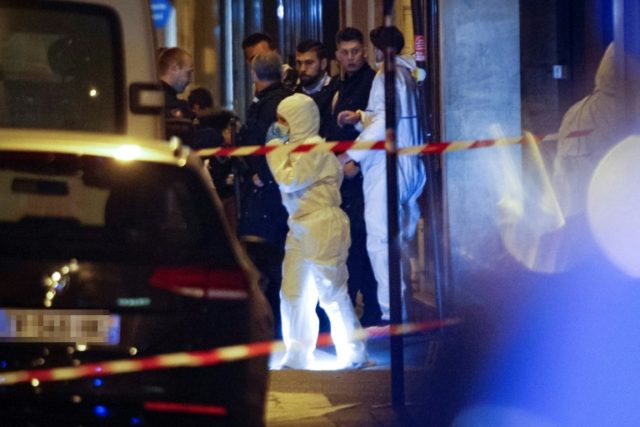Paris (AFP) – Investigators on Sunday were probing the background of a 20-year-old Frenchman born in Chechnya who killed one man and wounded four other people in a stabbing spree in central Paris, an attack claimed by the Islamic State group.
The Saturday night attack in a lively area of theatres and restaurants near the city’s historic opera house was the latest in a series of apparent Islamist strikes in France that have killed 246 people since 2015.
Panic broke out on the neighbourhood’s bustling streets with people fleeing into bars and restaurants as the man walked along stabbing people, yelling “Allahu akbar” (“God is greater”) before police shot him dead.
Police identified the assailant as Khamzat Azimov, who grew up with his family in Strasbourg, eastern France, a source close to the inquiry told AFP. The city is home to many refugees from the Muslim Russian republic of Chechnya.
He became a French citizen in 2010 after his mother was naturalised, government spokesman Benjamin Griveaux told French television.
Separately, Chechen leader Ramzan Kadyrov said on the Telegraph messenger app that the attacker had obtained a Russian passport when he was 14, before obtaining French nationality.
Investigators have detained Azimov’s parents for questioning in Paris, and searched the rooms the family rents in an apartment in northern Paris.
But a source close to the inquiry said “no incriminating element” had been found in the search.
A friend of Azimov’s in Strasbourg, also born in 1997, has been taken into custody for questioning.
Although Azimov had no criminal record, he had been on both of France’s main watchlists for suspected radicals — the so-called “S file” as well as a more targeted File for the Prevention of Terrorist Radicalisation (FSPRT), which focuses on people judged to be terror threats — since 2016.
One source said he had been questioned by anti-terror investigators last year “because he knew a man who was in contact with a person who had gone to Syria.”
Hundreds of fighters from Chechnya have joined Islamic militant groups in the Middle East, North Africa and elsewhere in recent years, following two bloody separatist wars against Russian-backed authorities in the 1990s and 2000s.
“Chechens have an important place in both previous and current jihads — they have a reputation for being tough, faithful and violent,” said Anne Giudicelli of the risk consulting firm Terrorisc.
– ‘He looked crazy’ –
Witnesses described dramatic scenes as the knifeman struck.
“I was taking orders and I saw a young woman trying to get into the restaurant in panic,” Jonathan, a waiter at a Korean restaurant, told AFP.
The woman was bleeding and a young man fended off the assailant who then ran away, he said.
“The attacker entered a shopping street, I saw him with a knife in his hand,” he said. “He looked crazy.”
Milan, 19, said he saw “several people in distress” including a woman with wounds to her neck and leg.
A 29-year-old man was killed in the attack, while a Luxembourg man aged 34 and a woman of 54 were seriously wounded and rushed to hospital.
A 26-year-old woman and a man of 31 were slightly wounded, though officials said all the wounded were out of danger.
China’s Xinhua news agency reported that a Chinese citizen was among the injured, citing the Chinese embassy in Paris.
French President Emmanuel Macron tweeted: “France has once again paid the price in blood but will not give an inch to the enemies of freedom.”
– ‘No such thing as zero risk’ –
The attack again underscored the difficulty in keeping tabs on suspected extremists by police facing thousands of potential risks, either from homegrown radicals or recent arrivals.
The FSPRT watchlist alone has nearly 20,000 people, of whom about half are under active surveillance.
“What good does this S file do if we don’t use it to get these ticking time bombs off French soil,” far-right leader Marine Le Pen posted on Twitter.
But Griveaux defended the government’s efforts, saying it had foiled 22 planned terror attacks over the past 15 months.
“Unfortunately, there’s no such thing as zero risk, and those who say that measures taken out of a hat would fix this problem are lying,” he said.
France has suffered a series of major Islamist attacks including the massacre at the satirical newspaper Charlie Hebdo, the November 2015 attacks that killed 130 in Paris, and the 2016 Bastille Day truck attack in Nice that killed more than 80.
Most of the attacks have either been claimed by the Islamic State group or been carried out in its name.
Thousands of French troops remain on the streets under an anti-terror operation known as Sentinelle, patrolling transport hubs, tourist hotspots and other sensitive sites.

COMMENTS
Please let us know if you're having issues with commenting.